In our experience here at Bennett Guthrie PLLC, it’s easy for people to get the idea that all lawsuits are criminal lawsuits, but we want you to know this is not the case. The process of suing, say, a business for neglectful practices is a type of civil litigation, and it is very different from the government bringing charges against someone arrested for assault or another crime (which is criminal litigation).

In this article, our team will go over more key differences between these two types of litigation so that you can get a better idea of what to expect if you decide to bring civil charges against a person or organization—or if you face such charges yourself.
- Who Brings Charges – One difference between the civil and criminal court systems is who brings charges, or who sues whom. In criminal litigation, charges are brought by “the people” or “the state” against the defendant because criminal actions are considered to be a threat to everyone in the community. In civil litigation, on the other hand, an individual, group, or organization can bring charges against any other individual, group, or organization.
- Terminology – Another key difference between criminal and civil litigation is the terminology used in each. In a civil lawsuit, for example, a defendant would not be found guilty, but rather liable for the damages listed in the suit.
- Burden of Proof – Criminal and civil litigation also use different standards for how to determine someone’s guilt/liability. In a criminal trial, the government must prove the defendant’s guilt “beyond a reasonable doubt,” while in a civil suit, the plaintiff (the party that sued the other), must show that the defendant is liable through a “preponderance of the evidence.” In other words, if there’s more evidence in favor of the defendant’s liability than there is evidence against it, the court will find them liable.

